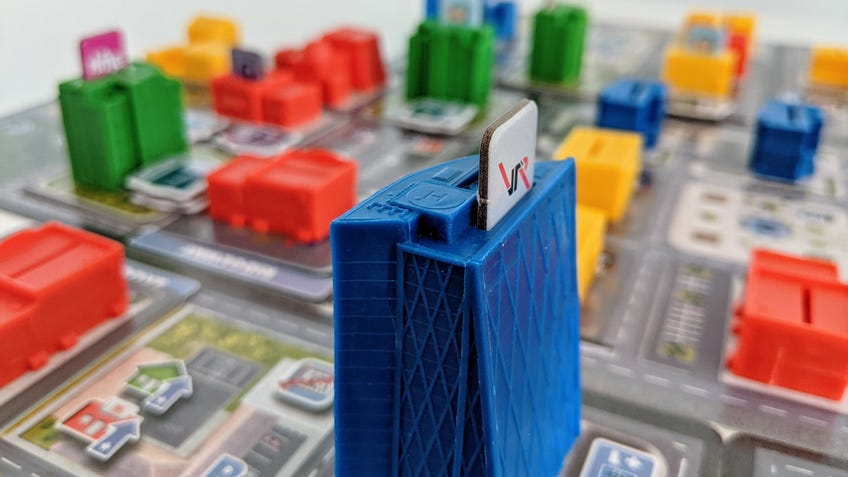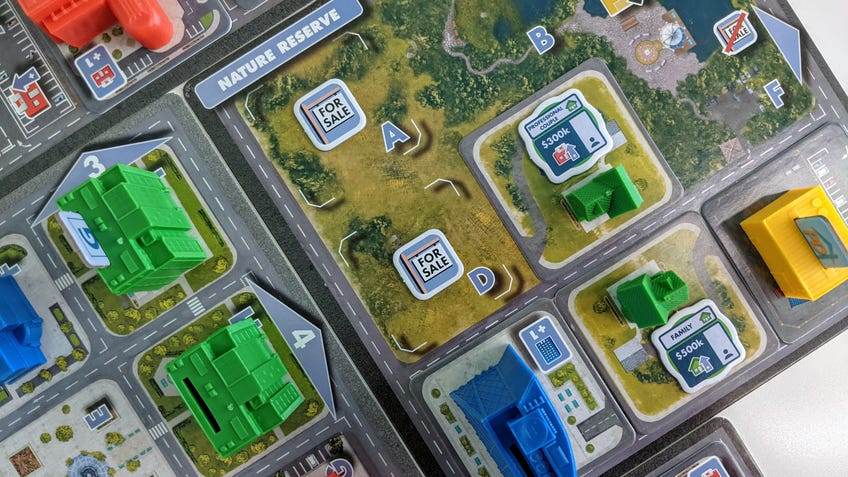Magnate: The First City is a metro-building board game striving for realism and interactivity
Property peril.
Two years after launching its Kickstarter campaign, competitive neighborhood-building board game Magnate: The First City recently brought its equal parts Monopoly and SimCity-inspired design to backers, with a public release planned for November. Designer James Naylor celebrated the event by publishing his thoughts on seeing the project from conception to the table, along with the guiding ethos behind his decisions.
Magnate is Naylor’s first title through the London-based Naylor Games and pits players against each other in a bid to become the top property developer by outmanoeuvring opponents to buy land in the city and build amenities that will rake in earnings. They will first need to leverage their resources to bid on plots then decide whether to zone them for offices, retail, residential buildings or industry. Each offers specific benefits in the short term but can quickly change the landscape of the surrounding city and limit avenues for expansion.
Opponents also benefit from whatever high-value tenant is persuaded to move in, raising the overall property value of surrounding establishments and creating vibrant sectors. Magnate: The First City ends with a market crash and encourages players to time their exit from the rampant real estate racket as close to that as possible to maximise profits. The wealthiest player walks away the winner, but it's all too easy to be caught up in a vicious burst bubble and lose everything.
Naylor explains that his vision has always been to create a realistic property board game that didn’t sacrifice interactivity in the quest for balanced competitiveness. He looked to older titles and modern classics alike, such as popular city builder Suburbia, and noticed that many focused too hard on recreating the single-player feeling of the SimCity computer game series, so often an inspiration for this genre.
He felt that Magnate could differentiate itself by giving economic forces more influence in its design. “City government and local institutions might lay the roads, the pipelines and electric cabling, but it is private interests that actually develop them,” he says in the design document. “You zone in SimCity, but you do not get to choose what emerges in those zones. To get the right occupiers, you can only shape the environment. From there, its people, millions of them, that collectively build the city.”
It’s easy to see how this setup could easily slip into a fawning, blind appreciation for huge property interests demolishing cities’ cultural centers to fuel gentrification. Naylor discusses the hit-and-miss nature of satire games and whether allowing that to influence design would undermine the mechanical satisfaction and ultimately fail on both fronts. Magnate’s core mechanics are informed by the socio-economic reality of the world’s largest population centers, Naylor claims, and those themes are more directly addressed in the lore created for the five companies vying for control of the city.

A large section near the end of the document wrestles with Naylor’s thoughts on the use of plastic components in both Magnate and board games, writ large. He admits that being a small publisher in a hobby that expects high-quality physical components puts one in a difficult position - wood can be far too expensive for smaller outfits, while cardboard’s trade-offs - recyclability vs. the energy used to produce it - make the decision a toss up.
In the end, Naylor says he opted for plastic building to allow the game to sell players on the scale of their developing city - small homes and plots being exchanged for condominiums, office complexes and towering skyscrapers. His process of making wise ecological choices is an ongoing one, and the recent Earthborne Rangers gets a name drop as a title leading the charge on sustainability within the hobby.
The design document, which is linked on Naylor’s Twitter, is an interesting read into a designer’s head as it developed over years. He ultimately hopes Magnate: The First City will be a title played dozens of times instead of sitting on a shelf, fondly remembered but never touched. “I designed it to be loved and to be treasured. Whether or not I have succeeded at all is not at all my place to judge. But it has been my aim: fewer, better games that get more plays is my mantra.”

